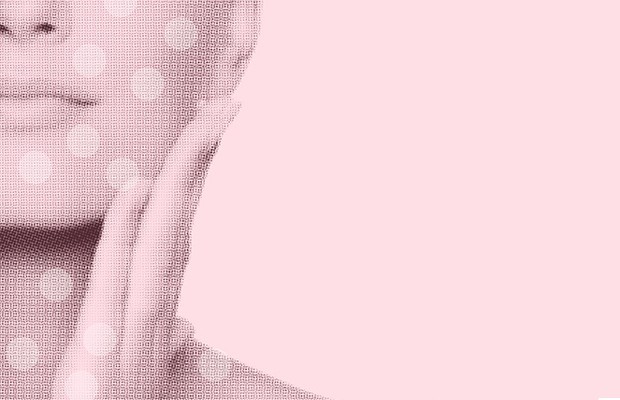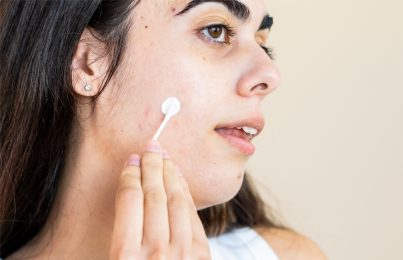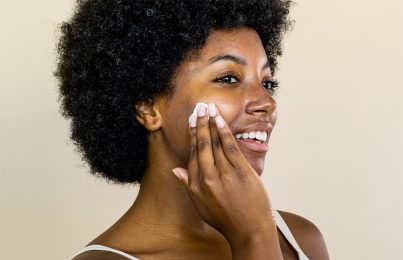Updated 3/12/19. If you’re someone who has acne and gets blemishes regularly, you’ve surely spent countless hours trying to figure out the cause, making modifications to your diet, lifestyle and your skin care routine in desperate hopes of preventing new breakouts from appearing. Acne is the most common skin condition in the U.S. and affects over 50 million people so you are not alone. If you feel like you’ve tried everything and nothing is working, don’t lose hope. Here are some ideas that could be the answer you’re looking for—or at the very least, give some improvement. My fingers are crossed for you.
1. Get your pores professionally cleaned out
If you’re someone who has little whiteheads and bumps on your skin that never seem to go away, as well as someone who breaks out in the same places all the time, then more than likely your pores are blocked. These bumps are closed comedones or simply known as ‘clogged pores’. When sebum (oil) hardens in the pore it can cause a blockage for bacteria to form causing blemishes to keep appearing over and over again. Plus, these clogged pores, when not in their infected blemish phase, are bumps on the skin that make the complexion look less than smooth.
The solution for this is to get all of these blocked pores cleared out with regular professional deep pore cleansing facials. (Or you can try doing it yourself at home with my step-by-step instructions.) Either way, clean pores can dramatically prevent breakouts from occurring and give the look of clearer skin. No laser, skin care product or professional chemical peel can take the place of professional extractions to remove the blockage in the pores and flatten the bumps. It’s also essential to use an exfoliating serum with salicylic acid as part of your home care routine a few times a week to help to keep the pores cleaned out to prevent the clogging from building up again. (More on that in tip #13 and #14.)
2. Consider taking DIM (Diindolymethane)
This is a supplement derived from cauliflower, kale and broccoli that is said to affect estrogen levels to improve hormonal acne. It’s basically like getting a super dose of greens every day that may clear up hormonal acne, and can even lessen PMS symptoms. It’s also been touted as a wonder-solution for menopausal women. (Read tips for preventing hormonal breakouts.)
3. Limit dairy in your diet if you’re prone to cystic breakouts in the chin and jawline area
Since most dairy cows are given growth hormones, the consumption of milk, cheese and yogurt become factors that influence endogenous hormones and mimic the hormones that trigger oil production in the skin to ignite the acne process. Consider eliminating all dairy for two weeks to determine if this is the cause of your cystic breakout activity. And of course, Anti Bump Solution is a must for visibly reducing the appearance of stubborn cysts.
4. Don’t dry out your skin with harsh acne products
While using gentler products isn’t necessarily getting to the root cause of your breakouts, I definitely know that over-drying the skin will only exacerbate acne in many cases. When the skin has layers of dead cells on the surface, oil and bacteria stay trapped and clogged in the pores making acne worse. If you’re someone who has both dry skin and gets breakouts, this is a sure sign that your products are too strong for you. Skin cells are like fish and need water to live so creating an environment in the skin where the skin be healthy and balanced is essential. Take my Skin Type Quiz here to see which products are best for you.
5. De-stress
I know this one is easier said than done but there is research linking stress and acne. The Stanford University School of Medicine conducted one such study in 2002. It was a small study that involved students suffering from acne. The college professors involved in the study conclusively proved that the exam stress worsened acne in these students. According to researchers, their findings indicated “Subjects who had the greatest increases in stress during examination periods also had the greatest exacerbation in acne severity”. Stress not only affects acne flare-ups but in general, it worsens the overall skin condition. It induces the adrenal glands into overproduction of cortisol, a steroid, which in turn makes sebaceous glands produce more oil resulting in oiler skin. Thus the reason why in stressful periods, people experiencing an increase in acne get more inflamed, puss-filled papules than simple whiteheads or blackheads. Meditate, exercise, get a pet, take yoga classes and practice deep breathing throughout the day. All of these have been shown to lower stress levels that can ultimately lessen breakouts.
6. Get more sleep
Proper sleep also helps stress so manage your day wisely to help you wind down at night and get proper beauty rest to help your skin. Americans are known to be very sleep deprived and our bodies need that time for renewal. I’ve also heard that a condition called adrenal fatigue may affect acne so look that up to get more information and consult with your doctor to see if they have knowledge in this area. But without a doubt, sleep and proper rest can work miracles for the bodies healing processes.
7. Use a calendar to track your lifestyle to see if you can find any patterns
I talk all about this here and doing this can be very insightful in your quest for getting to the bottom of the cause of your breakouts. Or at the very least, help you understand potential patterns for when blemishes appear.
8. Cleanse your face as the last step in your shower routine
Shampoo and hair conditioner may have some potentially pore-clogging ingredients that seep onto the hairline and down the cheeks and leave behind some residue. To prevent this from happening, wash your face after shampooing and conditioning so you’re sure the skin gets properly cleaned. In some hair conditioners, the ingredient panthenol can be used in high concentrations and could potentially be the cause of breakouts so you might consider looking for formulas without this.
9. Avoid using hand cream at bedtime
Those rich, luxurious hand creams can do wonders for your dry hands while you sleep, but if you’re someone who sleeps on the side with their hands on their face, all those oils could potentially be clogging your pores leading to breakouts. I know this one first hand. In my 30s, once I eliminated using hand cream, all the bumps on the side of my face went away. Now in my late 40s, hand cream at night doesn’t negatively affect my skin at all anymore, so the skin definitely changes. (And acne does improve with age. That’s one of the benefits of getting older!)
10. DO use moisturizer but make sure it’s a lightweight and oil-free one
People with acne-prone skin are paranoid about using moisturizer thinking that it will immediately clog up their pores. Sound familiar? Wearing moisturizer does not cause breakouts. Acne happens when the cells that line the inner pores fail to fall off properly, clogging the pore. This happens whether you moisturize or not. Those with oily skin must use moisturizer—no matter what. Your skin needs water to keep it healthy and balanced. Skipping moisturizer causes the skin to not have its proper water levels that leads to dehydration, which can cause the skin to stimulate oil production potentially causing more breakouts. Choose for the right moisturizer by taking my Skin Type Quiz.
11. Increase your exfoliation
As mentioned in tip #5, it’s important not to create dead cells by using over-drying skin care products. What’s very helpful is to be removing surface cell buildup on the skin regularly. After all, breakouts form when cells don’t shed properly so by using exfoliating products (cleansers, serum, and masks) regularly, you can get a huge improvement with preventing breakouts. In addition, regular exfoliation is what will remove discolored cells (the red, purple and dark marks left over from breakouts) to reveal more even-toned skin.
12. Use skincare products with salicylic acid
Speaking of exfoliation, this is definitely the ingredient to do just that. It’s a keratolytic beta hydroxy acid (BHA) famous for its ability to smooth the skin without causing irritation, reduce acne-causing bacteria and oil to prevent blemishes, all while penetrating the pores to help clear out impurities (making it also excellent for preventing blackheads after a deep pore cleansing facial). Salicylic acid can be found in AHA/BHA Blemish Control Cleanser, Daytime Blemish Gel, BHA Clarifying Serum and Triple Berry Smoothing Peel. These are all excellent to use for clearing clogged pores and preventing blemishes.
Looking for our most comprehensive solution for breakouts? Shop our Zit Care Kit, complete with everything you need to tackle blemishes at every stage.
13. Consider birth control pills
Birth control pills can have a positive effect on breakouts for many girls and women, so it’s worth considering taking it if you believe your breakouts to be hormonal. (Doing tip#8 will let you find this one out.) Since there are fluctuations in androgen hormone levels right before and during one’s period that can stimulate sebaceous glands to produce excess oil leading to breakouts, the pill may help due to their affect on natural hormonal balance. Consult with a doctor to experiment with different types of birth control pills if you want to go this route. Many of my clients have found that going on the pill or simply making a change in the one they are currently taking can reduce acne and those occasional hormonal breakouts. Some examples of FDA-approved birth control pills that seem to lessen breakouts include Ortho Tri Cyclen, Yaz, and Estrostep, but your doctor can help to determine the best course of action for you.
14. When possible, wash your skin three times a day
It’s a fact that oil causes bacteria and bacteria leads to breakouts. Therefore, the less oil you have on your skin, the less likelihood you have of breakouts forming. If possible, in addition to your normal morning and evening cleansing routines, try to get in an extra washing. Perhaps after working out or when you come home from work would be a good time to do this. Another option is to reduce oil production on the skin throughout the day with Daily Mattifying Solution.
15. If all else fails, consider oral prescription medication
I always think that prescription medication should be a last resort, but if you’ve exhausted every possible option, this may be another option to try. Possible options that your doctor might prescribe are antibiotics, (such as tetracycline, doxycycline or erythromycin), Spirolactone or isotretinoin (formerly known as Accutane).
Spirolactone is an interesting one as it was originally developed as a diuretic to treat high blood pressure but it’s now being prescribed off-label for improving adult acne in women. It works by blocking androgen hormones from stimulating oil glands. (Remember in tip #16 when I said that oil causes acne?)
Isotretinoin is tried and true but it’s saved for very severe cases of cystic acne when nothing else has worked and for those at risk of long-term scarring and pitting of the skin. Extreme dry skin and chapped lips are the main visible side effects, but there are many other side effects that your doctor will discuss with you.
In conclusion, every person’s skin is different as is their body chemistry. Not all types of breakouts are equal and not all types of bacteria that lead to a breakout is the same. This explains why some skin care products work very well for the improvement of acne while not helpful for others. The skin is very complex but consulting with a trusted skin professional like an esthetician or dermatologist is always recommended as we have a deep understanding of how the skin works and can lead you to potential solutions. I sincerely hope you found this post insightful and have learned a few things you may not have tried yet. Acne is no fun for anyone but did you know there is an upside and you just might be lucky for having it? Read this post.
One tip that wasn’t mentioned here is, ‘Don’t sleep with your makeup on.’ I didn’t include this one because I can guarantee that my readers wouldn’t even dream of doing such a thing! You definitely know better. If you do wear makeup, stop doing these 12 things to your skin.
Celebrity Esthetician & Skincare Expert
As an esthetician trained in cosmetic chemistry, Renée Rouleau has spent 30 years researching skin, educating her audience, and building an award-winning line of products. Her hands-on experience as an esthetician and trusted skin care expert has created a real-world solution — products that are formulated for nine different types of skin so your face will get exactly what it needs to look and feel its best. Trusted by celebrities, editors, bloggers, and skincare obsessives around the globe, her vast real-world knowledge and constant research are why Marie Claire calls her “the most passionate skin practitioner we know.”




Comments:
I wear cotton gloves over my hand lotion. It helps quite a lot.
Posted By: Catherine E. Hahn |
For #10, if you’re like me and NEED hand cream at night, put your hands under your pillow at night- I used to sleep with my hands next to my face after using hand lotion and then I thought to put my hands under my pillow and my breakouts greatly decreased. Plus, your pillow is softer than your hands 😉
I also change my pillow case every few nights.
Posted By: Rita |